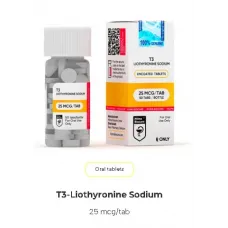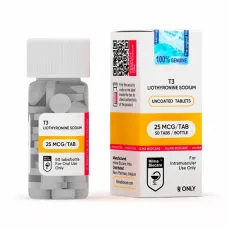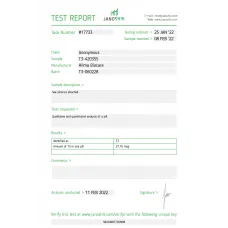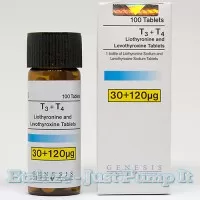T3 Liothyronine Sodium by Hilma Biocare
- Brand: Hilma Biocare
- Product Code: Liothyronine Sodium
- Reward Points: 36
- Availability: In Stock
- Warehouse US domestic 3
- $36.00
- Ex Tax: $36.00
- Price in reward points: 360
Tags: Liothyronine Sodium
Cytomel is the synthetic form of T-3/Liothyronine and was a commonly known trade or brand name among athletes. T-3/Liothyronine is used as a form of thyroid hormone therapy mostly in Europe. Most bodybuilders favored this drug over synthetic forms of T-4/Levothyroxine due to its vastly superior activity level.
An advantage of T-3/Liothyronine administration over T-4/Levothyroxine was the lack of dependence upon the liver enzyme responsible for T-4/T-3 conversion. During diet restricted periods the liver naturally decreases the liver enzyme levels as a control measure to prevent metabolic rate induced starvation. Just as the liver increases production of this enzyme in response to elevated calorie intake it also reduces levels in response to decreased calorie intake. Remember that T-4/Levothyroxine is only 20% as active as T-3/Liothyronine.
The abuse of synthetic T-3/Liothyronine will result in severe suppression of natural (endogenous) thyroid function. This is especially true of this drug because it actually circumvents the normal thyroid hormone manufacturing process the body utilizes to produce endogenous forms as required. Simplified this is because T-3/Liothyronine is the most potent thyroid hormone so the body shuts down each level required for production to try to reduce circulatory T-3/Liothyronine levels. Of course, this does not reduce the level of the hormone is being administered exogenously (from outside the body).
Since long term use of T-3/Liothyronine will lead to thyroid function suppression the issue of rebound should be briefly discussed. It is commonly stated that synthetic thyroid hormone abuse will lead to permanent thyroid gland dysfunction.
Though it is definitely a physiological possibility, I have not yet found a case study to support this statement. However, there is a common occurrence of thyroid gland/function rebound in natural endogenous thyroid hormone production. It seems that it was common for individuals to realize an "increase" in endogenous thyroid hormone production of 120-130 % within 3-15 days after drug discontinuance. This means an individual would commonly see an increase in their thyroid hormone production of 20-30% above their normal pre-drug administration levels, in many cases.




![Cytomel [25mcg/1tab] 100 Tabs by Meditech Cytomel [25mcg/1tab] 100 Tabs by Meditech](image/cache/wp/gj/16%20Meditech/Cytomel%20%2060_%20Italaze-200x200.webp)
